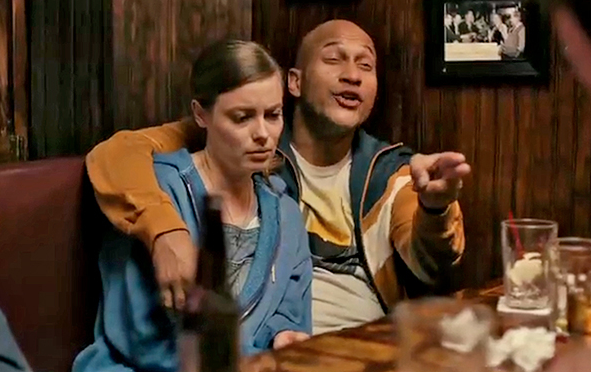For the six people that make up the NYC-based improv group known as The Commune, it’s often a hard day’s night. Indeed, the question posed by the group to the audience before each show is: “Has anybody here had a particularly hard day?” This serves as the jumping off point for each of the members, Miles (Mike Birbiglia), Samantha (Gillian Jacobs), Allison (Kate Micucci), Lindsay (Tami Sagher), Jack (Keegan-Michael Key) and Bill (Chris Gethard), to take something someone says and mold it from raw material into comedic gold.
While it’s apparent that the Commune crew is happiest when onstage, Birbiglia (who wrote and directed the film) accents the grim realities of life making ends meet as an artist in a city that is, as Lindsay puts it, increasingly “over.” While Miles relies on the income from teaching improv to afford his “college dorm”-like space, Jack delivers food, Bill serves hummus and cracker samples in a grocery store, Sam hostesses at a restaurant, Allison, well, no one knows, and Lindsay lives off the fat of her parents’ wealth (as her therapist remarks, “It’s not easy being the daughter of rich parents.”).
Looming at the forefront of all their fantasies, however, is the promise of one day achieving the ultimate improv dream: securing a spot on Weekend Live, an overt ripoff of/nod to Saturday Night Live. When members of the aforementioned show actually stop in to catch The Commune’s performance one night, Jack puts his most audition-y face on, impersonating Barack Obama to steal the show. At the end, both he and Sam, who are in a relationship, are asked to audition. The evening is met with bad news as well, when Bill informs them that his father has gotten in a motorcycle accident and has been hospitalized in his hometown of Philadelphia. Jack’s ever-increasing ego and insensitivity rears its ugly head in this instance as he is unable to mask how much more important he seems to think the news about his audition is.
Still, he manages to redeem himself by accompanying Bill and the rest of the gang to Philadelphia to visit his father in the hospital. Prior to the accident, a brief scene between Bill and his father expresses the contentious rapport between them regarding a viable career path–Bill’s father continuing to suggest that he get into real estate after informing him that he recently bought a porn palace he plans to flip. Feeble, but functional, Bill’s father musters out a creaky, “Thank you” to Bill and his friends for coming, one that will be imitated as a running gag throughout the rest of Don’t Think Twice. In point of fact, it is The Commune’s ability to laugh in the most dire of circumstances that makes each of them ideal for the often thankless, payless profession of improv.
As Sam and Jack prepare their sketches and impressions for the Weekend Live audition, it becomes apparent that something is eating away at Sam, clearly less enthused to partake of the opportunity. Meanwhile, the others try their best to go on as though nothing life-changing, perspective-putting into is about to happen to The Commune. Thus, when Jack actually lands the job, Miles, Allison, Lindsay and Bill’s reactions end up taking them somewhat by surprise, with each one suddenly starkly aware of how stagnant he or she is in life and in progressing toward “success.”
To quote Bill, “Your twenties are all about hope, and your thirties are all about realizing how dumb it was to hope.” The bleak nature of this revelation lends a dark pall to the group, seemingly left behind by Jack. Allison’s quiet doodling eventually gets explained as working on a comic book about a gifted sculptor who gets accepted into the best arts school in the country and then stops sculpting when she gets there. The symbolism, of course, is not lost in the translation of what’s happening in The Commune’s lives: the pressure to be funny weighing constantly on all parties in order to thrive, particularly Jack, who could easily get fired within the first year if he doesn’t impress the Lorne Michaels-like head of the show.
With the tagline, “The spotlight’s not for everyone,” Birbiglia highlights an unpleasant point about those in professions that cultivate the by-product of fame: while, yes, talent is half of the equation, a comfortableness with selling out and becoming a shill is perhaps even more essential. And if one happens to need to leave certain longtime friends by the wayside to do it, well, it’s got to be done. In this sense, like Morrissey says, we hate it when our friends become successful not just because it forces us to see that we’re still in the same place, but because we end up losing them in addition to just another little shred of our self-esteem, too.






















